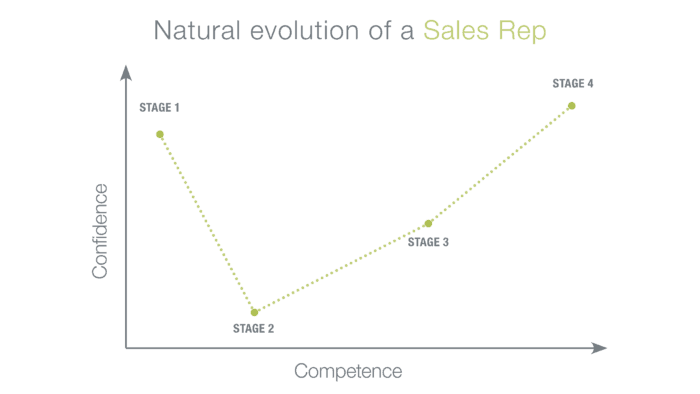BY: Stefan karpowicz
Great sales leaders know that making a successful sales hire is as much about equipping the candidate post-hire as it is about the candidate themselves. While there is an entire list of things you should consider when hiring a salesperson, a thoughtful management approach is critical for fast ramp-up and long-term engagement.
We often hear that different people require different management styles and that – as sales leaders – we need to be adaptable. The reality is, the same person needs different management styles as they go through their own evolution as a sales professional. There are typically 4 clear stages every sales person will go through if they are with your company for 18 months or longer. Your management approach needs to adjust to the stage they are in if you want to have them reach their maximum potential quickly and stay for a long tenure.

Stage 1: High confidence, low competence
When it will appear: Day 1
When it will move to stage 2: When they start failing
What to look for: The best new hires will already know a lot about you when they first join. They have scoured through your website, your testimonials and case studies. They have searched for news articles and employee reviews. They have thought about your value proposition and – in their – mind, it is an easy sale. They have not seen rejection or had to overcome objections yet. They want you to let them call the best companies and close deals. If you do, they will fail.
What you do: No one wants to be a micromanager, and no one wants to be micromanaged. But, in this stage you need to stay very, very close. You need to be on every call and check every email. If they are lucky enough to book meetings or presentations, you need to run them. It will feel very intrusive to them, so they need assurance from you that it will not be forever and you are only there to help them be successful and hit their on-target income.
Stage 2: Low confidence, low competence
When it will appear: When they begin to fail
When it will move to stage 3: When they start earning some wins
What to look for: After the first few rejections, they will believe that they just need a little more training and a few more repetitions. After even more rejections, they will start questioning themselves and this is normal. What you do not want is for them to start questioning your company, your training, and their entire decision to join.
What you do: You will have to shift from close micromanagement, to empathetic coach and supporter. They need to be assured that you have faith that their hard work will pay off. Measure them on activities and skill development, as opposed to revenues and pipeline building. Ideally, you can connect them with other top performers in your company that went through the same stage.
Stage 3: Medium confidence, medium competence
When it will appear: When they start getting a few wins
When it will move to stage 4: When they realize their full potential
What to look for: The losses become less and less and they start closing some deals. Their confidence does not immediately rise because at first, they will think they are getting lucky.
What you do: It is time for you to stop telling them what to do, and start letting them figure it out. You don’t want to completely take your hands off, but you should be asking for their perspective and ideas on their challenges and situations before you solve it for them. They still have some skill building to do, but their biggest improvements will come through repetitions and confidence building. Although they have earned some creative freedom, they have come to rely on you, so don’t go too far away or they will quickly lose momentum with a couple of losses in a row.
Stage 4: High confidence, high competence
When it will appear: When they are consistently hitting targets
When it will move out of this stage: When they get a new role (some people stay in this stage for years)
What to look for: They are good and they know they are good. They think they are better than you and if you have done a great job managing them, then they are correct. This is a result of all of the time and work each of you have partnered on to become better.
What you do: Go from manager and coach, to partner and supporter. Get stuff out of their way. Talk to them about their career aspirations and remind them that the most money they will ever make as a salesperson is in this stage, so don’t be too eager to go back to stage 1 in a new role or somewhere else. By understanding what your sales rep needs from you in each of these 4 stages, you can tailor your approach towards how you nurture them as they progress. Are you looking to make a key hire for your sales team? Contact us today to discuss how we can help you find the best salespeople and nurture them throughout the onboarding phase!
